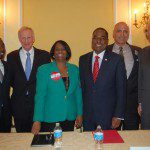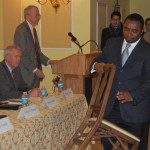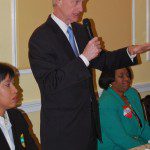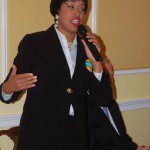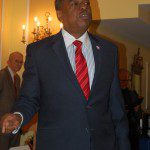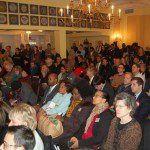Mayoral Debate: in Search of Gray and of Issues
By • April 11, 2016 0 1442
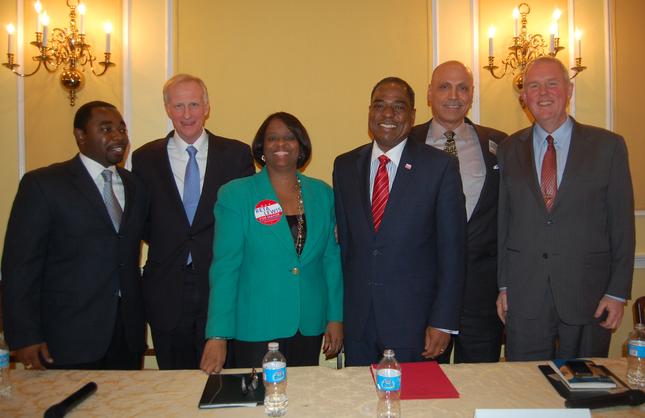
The District of Columbia’s Democratic mayoral primary is coming up faster in your rear window than a speeding motorcade. It’s on April 1 in less than 80 days, and its winner will likely take the general election to become mayor.
With a crowded field, it remains an unsettled and unsettling race—at least if the Jan. 9 mayoral debate, held at Dumbarton House in Georgetown and co-sponsored by the Georgetown Business Association and the Citizens Association of Georgetown, was any indication. The forum also got a bit of a stir when an uninvited candidate came forward and joined the panel.
Before a packed, standing-room-only audience, a total of seven candidates showed up to debate a variety of issues, some of them Georgetown-centric as befitted the location. Nevertheless, the whole process still resembled seven candidates in search of a dominating issue.
While the District Council candidates for mayor—Ward 2’s Jack Evans, Ward 4’s Muriel Bowser, Ward 6’s Tommy Wells and at-large Vincent Orange—jockeyed for leader-of-the-pack position, Busboys and Poets owner Andy Shallal and State Department veteran Rita Jo Lewis went some ways in establishing their bona fides as legitimate candidates.
But there was confusion on two fronts at this debate. Due to a public safety meeting, Mayor Vincent Gray did not show, depriving his competition and moderator Davis Kennedy, publisher of the Current Newspapers, from asking him once again about his role in his heavily investigated 2010 campaign for mayor. If that wasn’t enough, the debate at times threatened to turn into the Carter-Kennedy show, after late-arriving (by more than 15 minutes) candidate Christian Carter, a 31-year-old businessman in the District, was told by Kennedy that he had not been invited and would not be asked questions.
Carter, who throughout the proceedings sounded both refreshing and outrageous at turns, pulled up a chair anyway, even after Kennedy said only the council candidates and two candidates—presumably Shallal and Lewis—who were considered to be plausible long shots had been invited. That was mildly insulting enough. Then, Carter asked, “Isn’t it hard enough to run for mayor without dealing with you,” and declared, “I am a free African American man.” He then asked Kennedy, reluctant to recognize him: “Is this slavery?” Kennedy replied, “Yes.” By this time, there were shouts from the audience along the lines of “Let him speak”—meaning Carter, not Kennedy.
The two would spar a little later when Kennedy asked what he called a serious of tough, even “rude” questions of each candidate, including Carter, when he questioned his knowledge about D.C. issues, and whether, given that fact, he should be running at all.
Wells fared not much better when Kennedy, citing an unnamed colleague of Wells, said that Wells hadn’t accomplished much during his tenure, a charge which Wells appeared to refute without much of a sweat.
Evans was asked about his initial refusal to strip Ward 8 Councilman and former Mayor Marion Barry of a committee chairmanship. Evans responded it was enough that Barry had admitted to wrongdoing and that stripping him of the chairmanship would not allow him to be an effective representative of his ward.
The fate and future of a Georgetown Metrorail Station and the Whitehurst Freeway appeared to be hot button topics—almost everyone seemed to be for a new Metro stop—part of the Metro’s long-range plans as well as that of debate sponsors CAG and GBA and the Georgetown Business Improvement District’s long-range plans. Shallal, a trolley car enthusiast, threw in a word of caution: “Imagine the traffic jams around that project in Georgetown, because it will take a long time to complete and will be disruptive.” Nobody particularly likes the Whitehurst, but only Lewis outright suggested that it should be torn town. As Evans noted, quoting someone else, that “people hate it when they look at it and love it when they use it.”
There was some talk about local, neighborhood anti-crime watches funded by special taxes, which brought Evans to recall that he had been instrumental in the passing of BID legislation. “You’d have to have something like that,” he said. Orange went a step further: “Isn’t it about time we had a BID in Anacostia?”
Orange, Shallal, Lewis and Wells—in different ways—all called for dealing with the District’s growing income gap, for creating more real affordable housing, for challenging the government to make sure that it would not lose its middle class and for helping its least advantaged, most struggling residents.
Wells was obviously proud of the fact that he’s accepting no corporate donations. Money, he said, has always had a corrosive effect on politics, as it did, it appears, in the last campaign or in any campaign. He has already indicated that corporate contributions ought to be banned. He also advocated that school reform was a mixed bag, that it wasn’t over, that much more work needed to be done. “Every student in the District should have an elementary school within walking distance to his or her home,” he said. Orange suggested that one way to deal with financial ethics is to make it so that council members could not hold down another job.
The problem, however, remains the same in this campaign: incumbent and candidate Gray—absent or present—was and is the elephant in the room, precisely because of the cloud that hangs over him about his previous campaign and the fact that the investigation is ongoing. It’s an issue that now hangs over this campaign. The media won’t leave it alone—nor should it—and it’s fodder for his rivals.
In a city which appears to be economically strong and prosperous, which is, in fact, on its way to becoming that world-class city everyone talks about, other issues remain to be dealt with—liveable wages, low income housing, the homeless, fair tax breaks, the plight of seniors and children, a still wobbly education system increasingly charter-heavy, ethics problems, the disparity between highest and lowest earners, none of which by themselves seem to find clear visibility or traction.
All of those issues made an appearance in the debate, but not so much that the earth shook noticeably. The council candidates have records to defend or brag about, and Evans has more to talk about than anybody, one way or another, given that he’s the longest-serving council member.
None of the candidates appear to be solidly in the imagination of large parts of a population, which is visibly changing in its make. Hark the millennials are here, and Chocolate City has diminished in size. In terms of the campaign, it’s that old Carpenters’ song: “We’ve only just begun.
- Candidates: Christian Carter, Jack Evans, Reta Jo Lewis, Vincent Orange, Andy Shallal and Tommy Wells (Muriel Bowser left before the forum ended). | Robert Devaney
- Nora Birch

